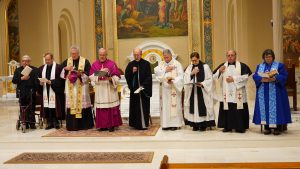
SCRANTON – More than 100 people came together at the Cathedral of Saint Peter on Jan. 24, 2024, to observe the global Week of Prayer for Christian Unity.
Catholic, Protestant, and Orthodox Christians were among those gathered at the Cathedral to uphold our commitment as disciples of Jesus, whose hope was that all of His followers may be one.
“As we put our faith into practice, we come to learn from one another, to see what we have in common and where we differ,” Monsignor Vincent Grimalia, Coordinator for Ecumenism and Interfaith Relations for the Diocese of Scranton, said in welcoming the crowd. “The parable of the good Samaritan teaches us to show love in spite of our differences as children of God.”
The Most Rev. Joseph C. Bambera, Bishop of Scranton, led the Ecumenical Prayer Service. Bishop Bambera serves as the chairman of the U.S. Conference of Catholic Bishops’ Committee on Ecumenical and Interreligious Affairs.
He urges Christians throughout the United States to unite across denominational lines and pray for peace.
“Given the paralyzing nature of polarization and tragedy of war that have spread throughout our world today, the importance of living the love of Christ in our own circumstances cannot be overemphasized,” Bishop Bambera said. “May Christians throughout our country come together across denominational lines to pray for peace in our world and an end to the sad divisions that prevent us from fully loving each other as Christ loves us all.”
The theme for this year’s Week of Prayer for Christian Unity was, “You shall love the Lord your God … and your neighbor as yourself.” (Luke 10:27)
The Reverend Rebecca Barnes of Saint Luke Episcopal Church in Scranton focused on that theme and the Gospel reading of the good Samaritan as offered a sermon.
“‘Who is my neighbor’ is a central question in our church, in our congregations and communities, in our ecumenical and interfaith conversations today. It is a question in our society at large,” Mother Barnes said. “Though we may not wish to admit it, I wonder how often do we think that people with whom we disagree or people who are different than us, don’t really deserve God’s mercy, don’t really deserve saving.”
In using the Gospel parable, she explained that “mercy is a gift freely given” by God, who uses it “for our weaknesses, our distress, our fear and our anxiety.”
In a world where that mercy might currently be in short supply, Mother Barnes challenged those in attendance to be like the good Samaritan and be courageous enough to act as each other’s neighbor.
“Together, we are called to be agents of God’s love, mercy, and healing. We are called to love God and love our neighbor. That is everyone – because we are all made in the image of God. We are all children of the one God – and so – we are all more than even neighbors. We are brothers and sisters, one of another,” she said.
The Week of Prayer for Christian Unity started in 1908 when Father Paul Wattson, SA, the founder of the religious order, the Franciscan Friars of the Atonement, conceived of the idea of a Christian Unity Octave – an observation of eight days of prayer – for an end to divisions between Christians.
Since the Second Vatican Council, it has been co-organized by the World Council of Churches and the Vatican’s Dicastery for Promoting Christian Unity.
